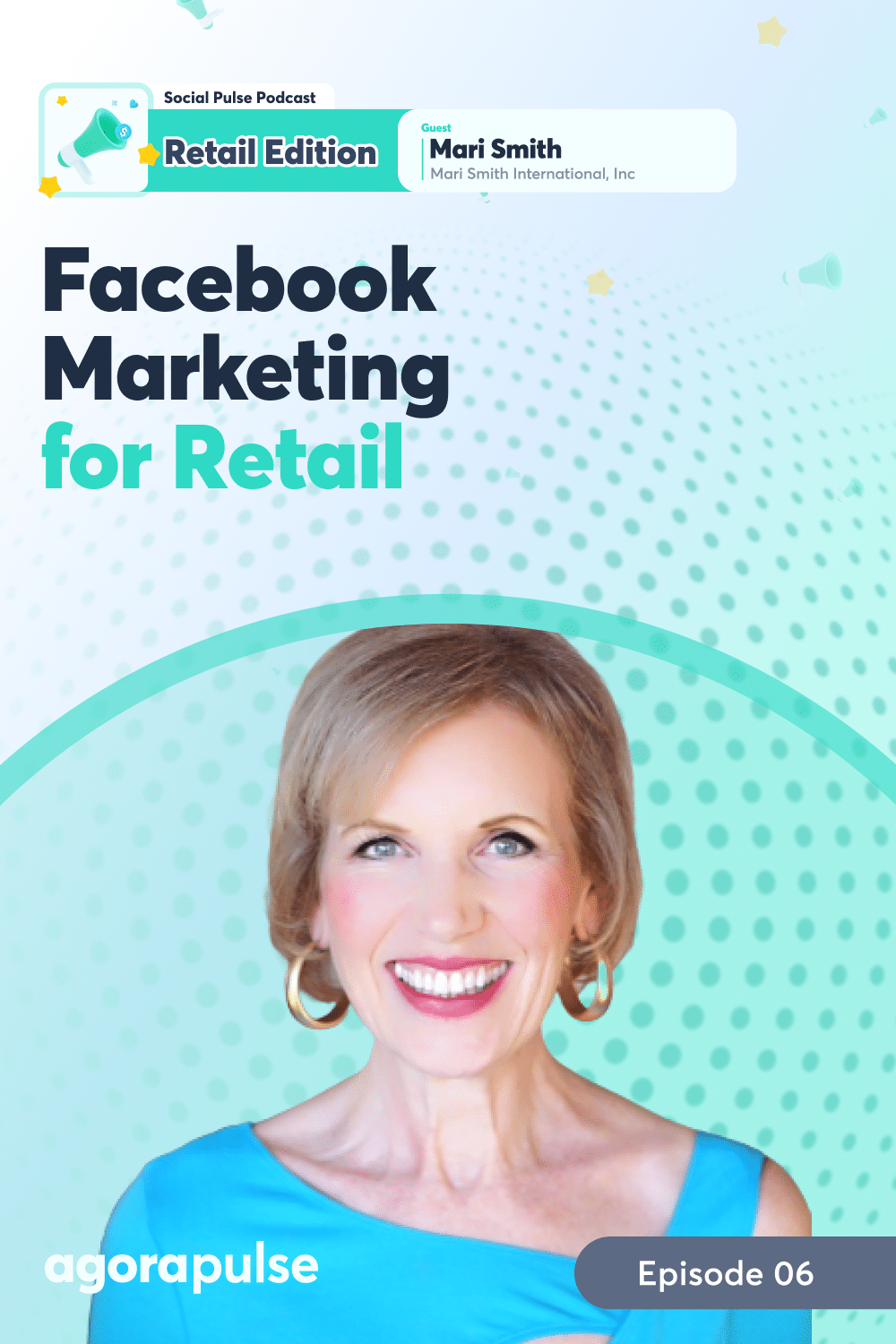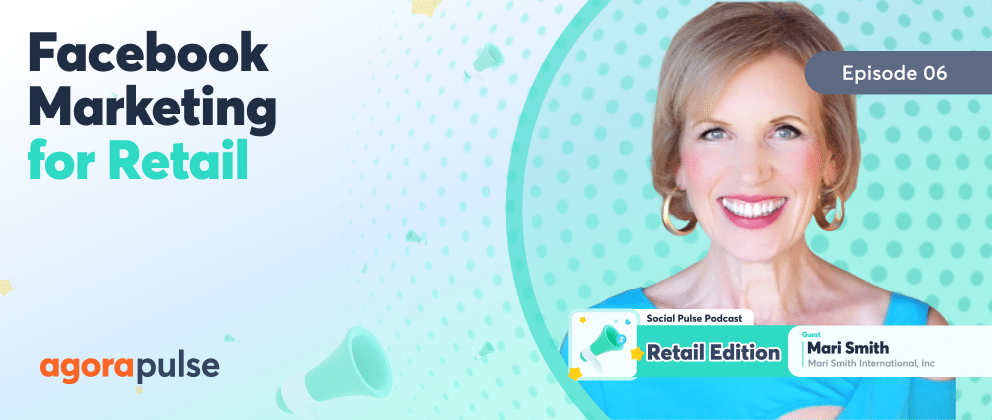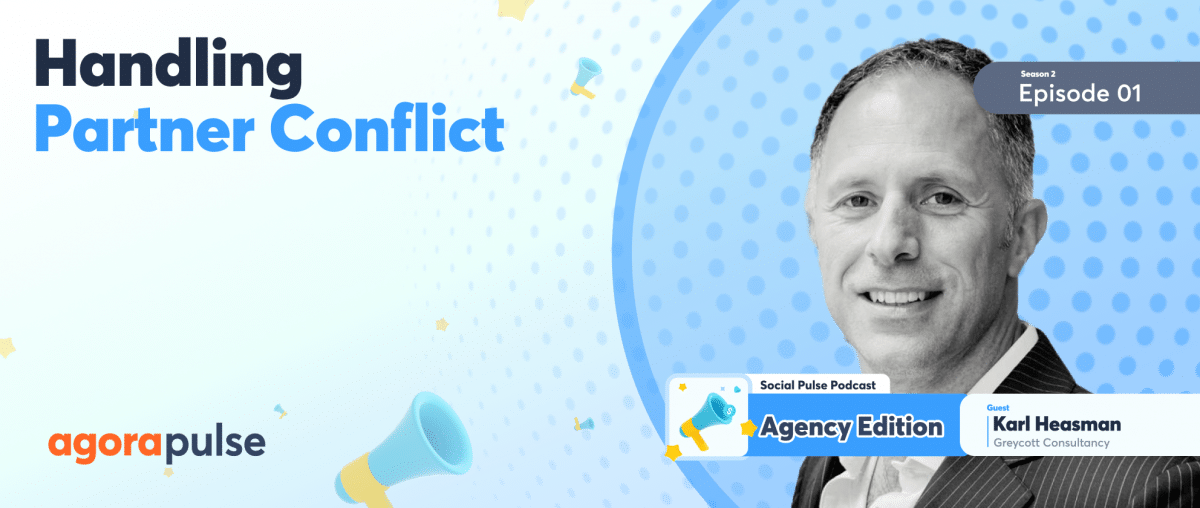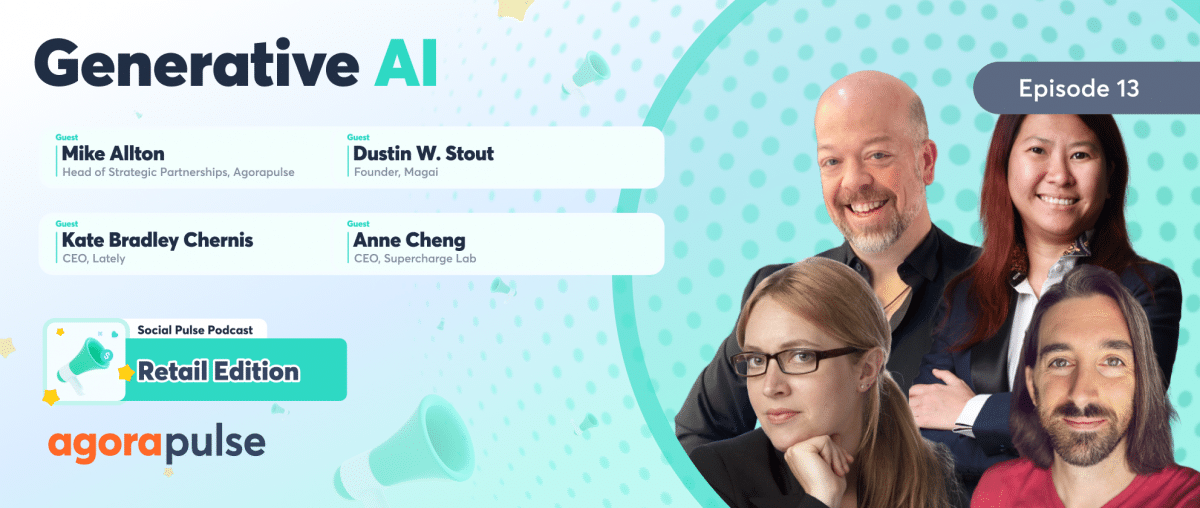Social media marketing has come a long way. Mixed reality, artificial intelligence, wearables, and that’s just the last three months for retail marketers. Developments like these are not just fads. They’re challenges to be met, understood, and potentially leverage those opportunities.
But how do you know what new features or apps should be leaned into and which ones should be ignored? How do you not only keep up with all the developments to Facebook and the rest of Meta’s family of apps but position yourself to actually come out ahead?
That’s exactly what Mari Smith is going to talk to us about in this episode Social Pulse Podcast: Retail, hosted by Agorapulse head of Strategic Partnerships, Mike Allton. You can listen to the entire show below or read on for the transcript.
Mike Allton: Often referred to as the queen of Facebook, Mari Smith is widely known as the premier Facebook marketing expert and a top social media thought leader. Forbes describes Mari as the preeminent Facebook expert. Even Facebook asks for her help. IBM named Mari as one of seven women shaping digital marketing. She’s an in-demand keynote speaker, dynamic live webinar host, savvy corporate social media strategist and trainer, and popular brand ambassador, and someone I’ve personally turned to for years as a voice of reason when it comes to Facebook and meta.
How Retail Marketers Should Keep Up With Change
If you’re a retail social media manager today, how do you manage all this information?
Mari Smith: I would say the number one key is curation. Be really good, extremely good at curating. Now you’re like, “OK, Mari, well, that means I have to go to all these sources and cherry-pick.”
But you could have identified trusted sources that are going to do the curation for you.
For example, you might subscribe to a newsletter that summarizes all the social media updates for you and puts their spin on it. I really encourage social media managers to have their own spin, to be able to interpret what’s happening in the landscape, and I specialize mostly in Facebook, Meta platforms, but to be able to put your own interpretation and go, “OK, I see this update. Now how does this affect me? How does this affect my brand that I work for? My role? Is this something I really need to pay attention to?”
Resources for social media changes
Maybe you have a favorites list on Facebook or Instagram of top people that you follow, or (I absolutely recommend) subscribing to select newsletters. You’ve got certain podcasts. I love that you’re doing this podcast here, Mike, and maybe even joining a social media training group or club. I know Social Media Examiner has their society. For me right now, with AI and specifically how generative AI and AI developments in general are impacting the world of social media and marketers, I really love to follow Paul Roetze, the CEO and founder of the Marketing AI Institute, and he has the Artificial Intelligence Podcast with Mike Kaput.
Maybe if it makes sense in your business, in your company, maybe there’s an internal role. It might be part of the social media manager’s job, but an internal role would be someone whose sole job is to be a chief curator or a chief summarizer. Someone who does consume huge amounts of news and updates and follows all of these leaders and then distills that into summaries, extracting only what needs to be, shared with you and impacting your job as a retail social media manager.
And then, of course, we were just talking about AI, so I would interject right in here. You may find that you can turn to a lot of AI tools to provide it certain sources of trusted information, maybe Google Gemini or ChatGPT, and train those tools to read sources of news and then provide you with summaries.
What shouldn’t we be paying attention to?
Mike Allton: There’s a lot that does happen with the apps, with the networks. Some of its trends, some of its actual features and developments. Are there aspects of Facebook or social media overall that we should steer clear from or avoid paying too much attention to?
Mari Smith: I love this question because (and I won’t name names) there are definitely folks in the social media industry who their specialty is to let you know about every nuance. “Oh, this button moved from here to here!” Who cares? I just don’t have time to wade through all of those kinds of updates.
I always have this kind of mantra is like, “OK, how will this impact generating more business for me, for my company, for my brand, right? Does this update, this change, this new feature, help me to drive more leads, to generate more leads, and drive more sales?”
Generally speaking, I would say most social media managers don’t necessarily have to pay attention to every single little nuance, every technical, or even aesthetic change. It doesn’t have to be at the top of your mind on a daily basis. You can peek in maybe once a week and have a quick skim on some of those newsletters or people that really post updates every few minutes.
Mike Allton: In other words, we shouldn’t freak out because the stickers moved and got this jumbled. We shouldn’t panic about that.
For those of you listening who don’t know, that was a recent change to Instagram when you went to add a sticker to a story. I think that’s a really good example of how the industry has moved. And there was a lot of panic among some of the subset people in the industry. And that’s a perfect example, I think, of the kind of thing that we want to avoid. We want to avoid worrying about that. We want to avoid letting that kind of drama and panic into our lives. And to your point, focus on the things that are going to actually move the needle for the business.
How Is AI Going to Be Affecting Us (and Our Work)?
One of those things in particular is AI.
AI is not bad. It’s not going away. It is here. I don’t want to go so far as to say it’s coming for our jobs. It’s not, but we do need to have a far deeper understanding of how AI is going to impact our jobs, our roles, our industry. We’ve had some big news just this week with Meta AI, how that’s being integrated into all of Meta’s apps. It’s basically Meta’s version of ChatGPT or Gemini.
What do you think AI means to marketers and retailers today?
Mari Smith: Well, it’s been interesting because I’ve been watching and paying attention very closely to Mark Zuckerberg. I believe it was February last year that he declared Meta has a turbocharged focus on AI and then it was later that year, last year, that he said the Meta was focused on building a world-class AI assistant for basically everyone. Then he went to list off creators, businesses, entrepreneurs, developers because, the Llama 3 is open source, developers can build on that. That’s great. There’s different arguments for open source versus not. The thing is it’s super-early days.
However, with Meta being a trillion-dollar company, we’ve got to pay attention to what they’re doing.
Let’s circle back to Paul Roetze’s podcast just this week. He was even using the words like “blown away.” He was blown away by this new feature that Meta brought out. It used to be called “Imagine with Meta AI,” which was a standalone text-to-image generator. Now that’s all just baked into the Meta AI tool, which you can access in over a dozen English-speaking countries now outside the US.
If you’ve got folks around the world listening to this podcast, I predict that the Meta AI will roll out pretty promptly to most countries. And so now you can go to Messenger search bar, Instagram direct, inside the inbox search bar. And then WhatsApp, search bar, message bar, and you can start interacting with it. You can ask any kinds of questions under the sun, translate something, come up with an idea, outline an article, news, whatever you want. You’re interacting with this chat assistant just the same you would with ChatGPT.
If you start your prompt with the word “imagine,” the image just pops right up, and as you’re typing, the keystrokes are typing, you’re putting in some different words. Imagine a cat who is wearing a unicorn hat floating in the clouds, the minute you’re typing the keystrokes, it’s popping up in front of you.
“There’s no question that Mark Zuckerberg and team are investing billions—tens of billions—into creating the most robust AI infrastructure on the planet.”
Now, here’s the thing that we want to pay attention to as marketers. I think by now most marketers, social media managers, are familiar with what generative AI even means, right? You go to whatever favorite tool of choice, you punch in a prompt and it generates content, whether it be text or image. Now you’ve got video with OpenAI’s Sora before long. I’m sure MetaAI will have us doing video, but also looking a little bit further ahead on the horizon, what Meta and Zuckerberg are also building is this artificial general intelligence, AGI.
Eventually, robots will have this autonomous self-control. They’ll basically be sentient beings with self-awareness, which creeps me out a bit.
What Is Facebook/Meta Up To?
Mike Kaput had mentioned it on the [Artificial Intelligence] podcast. He said that Zuckerberg potentially undermines competitors to the point of destruction. So at some point as marketers, we might be going, “Oh my gosh, Meta AI is baked into all these tools I’m using anyway. I can generate images, animate, just press a button, and it animates it. It’s real-time. I can do all this. It’s built-in. Baked into the apps.”
My prediction is: Sooner or later, we’re going to see this Meta AI will be absolutely baked into Meta business suite and then Meta ads manager. Then you’ll have everything you need at your fingertips. You won’t really need to leave the apps to go generate your content.
What I’m personally quite excited about that will be coming at some point is the ability to use AI to drill in and analyze our audiences and to create much higher performing ads—not just with the content, the assets, the media—but really understanding and segmenting the audience, then broadening and reaching a wider audience as a result of the integration of AI.
Mike Allton: I’m glad you mentioned Paul’s podcast specifically. We’ll link to that because you’re absolutely right. It was something they talked about extensively from a lot of different perspectives.
One of which that I want to touch on is Mark Zuckerberg’s motivation. This is not new, folks. You should not have any illusion that, that this is kind of a new phenomenon here. His favorite quote was “Carthago delenda set,” which means “Carthage must be destroyed.” And he was quoting that back when Google+ was one of their primary competitors. I wrote about this for Mark Schaeffer’s blog. (I’ll link to that in the show notes so you guys can get a little bit of history there.) This is what I do with social media: I pay attention to how things have gone and how they relate to what’s happening today.
You all need to understand that Meta AI is free, and it does everything that the paid versions of ChatGPT and Gemini do. This is presumably—obviously Mark Zuckerberg has not said this—but those of us watching and seeing this as his approach, his strategy is, “Let’s give this away for free to billions, hook them on it, and then roll out some additional features and get them using them on our platforms.”
Real-Time Creation
To your point, the real-time image creation is amazing. This, folks, is something that definitely you can be using as marketers. I use AI-generated images now throughout my blog, and I’m using Dustin Stout’s tool Magai, which integrates with DALL-E 3 and MidJourney because it’s just an easier interface.
I can go in there and I can say, “I want a bear wearing human clothes and a fedora,” because I wear fedora hats in a Star Wars setting. And then I tell it that he’s doing something. He’s analyzing Instagram analytics or something. And puff! It spits out a bear in this costume, in this environment, doing something interesting.
But the difference is I can’t change that image, right? Whatever it is, that’s it. If I want a new image, I have to do a new prompt or hit it again or something like that. I can hit backspace and change the words and have it.
We’re all going to be talking about how people are generating real-time like Meta AI is.
How do you think social media managers can stand out today, particularly in retail, while they’re using these tools?
Mari Smith: I believe that the way to stand out amongst this cacophony of synthetic media content is to: lean even more into the human, personalized, real touch, build community. Going the extra mile to make people feel special, important, and included.
- Maybe it’s time your retail business sent more personal notes, handwritten notes in the mail.
- What if you did something bizarre and picked up the phone and called people?
- Do something unexpected because it’s fiercely competitive out there.
- Absolutely use people’s first names.
- Hop into the DMs when you can.
- Have people direct message you.
Don’t Let a Chatbot Do All the Talking
Depending on the size of your business that you work with, a lot of retailers here would deploy the use of a chatbot, which is a great way to get call-to-action. It’s a great tool to be used in Instagram in particular, because it’s more difficult to put links there except in Stories. You can put links in your Stories but encourage people to DM you.
You’ve got a chatbot to at least initiate the qualifying of a prospect and then direct them to a specific space on your website, perhaps to make a purchase, but they should always be able to jump in there with the real human engagement.
I know Agorapulse does such a good job with that, with the amalgamated and aggregated social DM box.
Mike Allton: Yeah, I think that’s so true. That personalization, that human touch. I think we’re going to see even more live video from the brands who truly want to connect with their audiences.
I’m thinking about doing more live videos. I do these podcasts that are being recorded. Even my webinars are live, but they’re not streamed to social media. And I’ve been trying to think about it internally in the team: “What can we do that is a little more human, a little more personal?”
The Future of Facebook Marketing
I think a lot of marketers today are (rightly, I think) concerned about the future of social media and online marketing.
Where do you see Facebook marketing heading in the next few years?
Mari Smith: There’s no question we’re going to see a massive increase in even more AI-generated synthetic content media. It’s all going to become really automated. At the same time, that could also be very homogenized. AI has a long way to go in terms of getting people more realistic.
I’ve seen even just some businesses and marketers just say, “That’s it. We’re just going to give up and stop using Facebook altogether.” I’ve seen that over the past year or so, because it’s just gotten more and more challenging on Facebook and also because reach is so low.
And then you’ve got the AI-powered discovery engine, which pushes, Meta says 20%. I actually think it’s way more than 20 percent, but I think they’re just being conservative.
All of the content that people see in their feeds is from unconnected sources. So it’s from people, pages, and groups even that you don’t follow and that you’ve never heard of, and they get pushed into your feeds in the hopes that you’re going to engage with it. From a user standpoint, it can be quite frustrating because you’re like, “Where’s all my friends? My pages that I have signed up to follow?” At the same time, Meta has stated it is increasing time on-site, maybe 6 or 7 percent on both Facebook and Instagram, but I feel that we need to revisit what social media success even is.
Prioritizing Community Above Numbers
I’ve been beating this drum now for several years—not just the influence of AI—and I’m here to say that it’s not necessarily the vanity metrics of more and more and more. Just “let’s get more followers and get a viral reel, a viral TikTok video, get more engagement.” And I’ll say, “None of that actually pays the bills.”
It’s good, and it’s important, and depending on the size of your brand, you want to have some decent content and engagement going on. But I’d also rather see businesses focusing on perhaps building a community.
Like Canva, for example, Canva’s user group and Facebook community is really huge, and they’re quite engaged in there, and it’s got a lovely culture. And so just foster those genuine relationships.
“Create a loyal following of people that love you. And love to buy from you.”
It’s not about, “OK, hey, our stats are up.” Well, which stats?
“We got more likes.” Okay, well, did that lead to generating more prospects and sales?
It’s not about fire hosing and blasting everyone with more and more content.
The Future of Facebook Advertising
Going down the path a year or two, there’s no question that Facebook marketing, especially on the ad side, will be more automated, just pressing a few buttons, like we mentioned earlier.
I’m envisioning being able to go into Meta Business Suite, having your clear prompts, knowing what’s possible, staying within the confines of what you want to create for your brand, and spitting out this content, the written, the video, the text, the audio, all the above, image of course, and getting it all lined up and just being able to schedule it. And then, of course, you’re going to go back and do your engagement.
One of the areas I mentioned earlier, too, is: I really am excited to see what’s happening on the ad side because—keep in mind, I’ve said this for 15 years—ever since Facebook introduced the whole advertising side of the business, there is no more granular audience that you can target with your ad dollars than through meta platforms, because they know an inordinate amount of data points about every single user and there’s almost 4 billion across all the apps.
Can you imagine being able to have your ad campaigns being targeted? Oh, I’m calling it now: ultra-automated. Obviously, you’ll have to oversee it a bit. Don’t let the machines get too carried away, but ultra-automated to the point the sales are just pouring in without a whole lot of oversight, because to me that’s a brilliant use of AI and automation.
Mike Allton: Those are fascinating insights.
I couldn’t agree more with the point you made earlier, which is that businesses are looking at the wrong metrics too often. They’re paying attention to likes, to new followers, and those things are okay. And there are some instances where we do want to pay attention to those.
We talked about that in the previous episode with Jen Herman on Instagram, about which metrics were really good for indicating. Whether you’re doing well on that particular platform, but I’m always curious about how do we measure the actual business impact? Because, like you said, they aren’t paying the bills.
How do we measure, or how do you measure the business impact of social media?
Mari Smith: It’s definitely up to each business. I would say it comes down to leads and sales, ultimately.
For me, I do have a focus on building up what I call relationship equity. So, I’m not always in sales mode. I’m always in relationship-building mode, and I love to be able to have this seamless presence when people see me working. Just sharing my life, or sharing updates, or I’m speaking at this event, or I’m on this podcast, and, “Oh, I’m teaching this course, and here’s where to sign up.”
It’s the same style.
Gosh, I’m just reminding myself of a long time ago, maybe 15 years ago. I was in a mastermind group, and one of my fellow member says to me, “Mari, I’ve been analyzing your tweets. I’ve studied your tweets. I’ve done a little analysis and I’ve figured out your formula.”
And I don’t remember the exact formula, but let’s say it was like, “You’re 57 percent personal and 43 percent business.” And I just looked him in the eye and laughed. I’m like, “I don’t know where you got those numbers. I am 100 percent…” And I knew he thought I was going to say personal. I said, “I’m 100 percent business.”
Everything I do is strategic. Even my personal updates. I’m thinking about “how will this position me? How will this influence people to possibly sign up for something?” Obviously while staying true to myself.
Back to this aspect of relationship equity, I’m always on a mission to cultivate deep trust, respect. I’m not interested in a fickle audience.
I’d rather have a smaller audience that is extremely brand loyal. And, for me and my business field, and when I do make an offer, I have a paid course or a webinar or something that I’m offering that people can sign up and pay, then I’ve built up that relationship equity, and my audience is extremely receptive.
Mari’s Tool Stack
Mike Allton: This is something I always like to ask all of my guests. What’s in their tool stack? Because everyone’s got different things that they’re using. Some use a lot of tools. Some are like, “No, I’ve got these two tools, and this is all I use.”
What is Mari Smith using to create her empire on Facebook?
Mari Smith:
- My marketing automation platform of choice is Keap, formerly known as Infusionsoft.
- I love Leadpages for doing my landing pages, my opt-ins. I got profiled on Leadpages blog not long back.
- On the AI side, I am using Google Gemini and Perplexity, little bit of ChatGPT.
- Now, as of a few days ago, I’m going to be leaning much more into Meta AI.
- This isn’t necessarily for what I do out in the public, but I just love the Fathom note-taker, and I’ve changed the name. It’s “Mari Smith AI Secretary,” and she joins me on every Zoom call, and she summarizes and makes it all easy-peasy.
- I just started dabbling, too, with HeyGen. I’m a little spooked by it, but the ability to create your own avatar, or use one of their stock avatars, and the ability to potentially convert some of my courses into different languages. Maybe make an avatar version of myself. I know a good friend Molly Mahoney. I saw her doing something with an Avatar. She’s like, “Yes, if you notice, I’m a little bit expressionless, because this is AI me, because I didn’t want to get camera ready.” And I’m like, “Ooh, that appeals to me.”
Mike Allton: Yeah, there’s so much happening with the AI. There’s new tools every single day. And I love that you mentioned Fathom. That’s something that again, internally, we’ve been using a lot of different testing, a lot of different note-takers.
And so it’s funny, because now we’ll join a team meeting and there’s five or six different AI note-takers that are all joining. There’s more note-takers, it seems, than participants in the community. We’re all testing different tools to see which one works the best or resonates the most before we take the plunge and pick one for the team.
Keeping Tabs on Facebook Updates
One of the topics you mentioned early on that I appreciated was all these different resources that you turned to.
My last question for you is: Is there anything else, any other specific podcasts, newsletters, any other individuals?
One of the things that we talked about in the green room is that when we’re done here, you’re going to the Facebook earnings call, which I think is fantastic. I was a trained historian, so going to those primary sources and getting that kind of information I think is fantastic. But, of course, most social media marketers are not going to attend earnings calls.
What other resources do you recommend for them?
Mari Smith: For sure, for me personally, I follow Mark Zuckerberg on both Instagram and Facebook and threads a little bit.
And for sure, Adam Mosseri, head of Instagram. Both of them have Instagram broadcast channels. So I don’t subscribe to a lot of IG broadcast channels. It’s just too much. And so when I see the DM notification also on messenger and I’ll see, “Okay, something’s happening.” It’s a piece of news they’ve shared elsewhere.
Anyway, Zuckerberg seems to do these. And then Zuckerberg started doing this years ago where the minute he’s finished sharing his 10-15 minute prepared remarks, they get published on his Facebook profile. And what I do, Mike, is I literally will copy and paste them, and I go through line by line. I start interpreting and basically integrating all of that into making sense.
Mike Allton: I love that you mentioned following Mark, following Adam Mosseri, because that is really true.
Folks, you need to understand that’s a little bit unique. The other social networks don’t necessarily do that. Google+, one of the big headaches I had—even though I love the platform—is that every time they had an update, they would pick some random engineer to share, “Hey, we just did this on Google+” years ago. As someone who was actively writing about social media changes at that time, it was next to impossible to predict where those changes were going to come from. You just had to wait for somebody else to spot it in the wild and say, “Oh, yeah. Evan Ivanovich said that they just released this new feature for Circles.”
Tell folks, Mari, where can they find you? Where can they follow you? Where can they learn more?
Mari Smith: Sure thing. Yeah, Facebook is Mari Smith. From there they can see the group is the Social Scoop is the main one. Instagram is also Mari Smith, and those are the main ones. I do have a YouTube channel, a LinkedIn, and I’m not really doing much with Twitter/zx or Threads. So, and of course my website is marismith.com.
Thank you for listening to another episode of the Social Pulse Podcast: Retail Edition, hosted by Mike Allton and powered by Agorapulse, the number one rated social media management solution. Subscribe to gain valuable insights that you’ll be able to apply to your own work and social presence from each and every episode.
If you enjoyed this episode, please subscribe on your favorite podcast player, and be sure to leave us a review. Your feedback is important to us.






